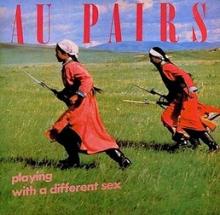If nothing else, Au Pairs are concerned with working up a dervish of rhythm and sing-speaking enough weirdness as to slot themselves into someplace not too distant from Gang of Four or even the Slits if one were to truck in the most obvious references. Even if digging up a slew of other then contemporary lady-bands, the Au Pairs unquestionably possessed a musicianship unparalleled. That actually goes for all dude bands as well. This was just an adept set of players.
That maybe the point to all of this, though. Even if we were to totally disregard the resultant music, the fact that this amalgam of people were getting up on stage under the banner of Au Pairs was a statement in and of itself. The music, remains a bit more interesting the why it was made.
Either way, the ensemble’s Playing with a Different Sex, released in 1981, is usually well thought of. And there’s no reason to skirt that understanding of the disc. The thing is, there were so many other groups trucking in this music by that point, it seems redundant. Of course, the fact that the Au Pairs retained an aggressive approach to music when groups like the aforementioned Gang of Four, Simple Minds and Scritti Politti eventually embraced a pop vision should make the Birmingham group of interest.
Even as dub infiltrated Au Pairs’ sound there was a tension achieved through supplemental sound effects. “Repetition” points towards the band’s understanding of krautrock (thus its title and those weird sounds laid atop the rhythm) as well as Jamaican musics. The track is an independent monolith might not rank as the most notable of the era, but again, but ‘81 there was more fey nonsense making its way into independent music then necessary.
“Come Again,” which almost sounds like X if they’d been Brits and a few years younger, grants listeners an earful of punk as it existed in its post ’77 vintage. Aurally, the song presents a few problems – or at least prompts a huge number of questions. Is that punk? Was punk over?
Those things have all been asked previously – and they’ll be asked again. Whether or not it matters as much as listening to good music, though, isn’t debatable.
